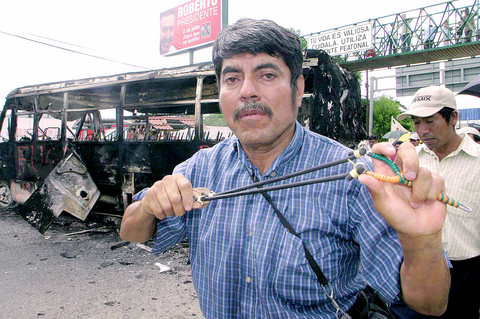Normally vibrant and thronged with tourists, picturesque Oaxaca City has ground to a virtual halt as protesters armed with pipes, machetes and clubs roam the cobblestone streets -- burning buses, seizing media outlets and blocking highways and bus stations.
The three-month-old protest -- now almost an insurrection against state Governor Ulises Ruiz -- made many in Oaxaca afraid to leave their homes on Monday, as striking teachers, trade unionists and leftist sympathizers shut down most forms of transport and warned residents it was unsafe to venture outside, even to take their children to school.
"You are running a risk by taking your children to school, to all the private schools," a female protester said in a radio broadcast from one of a dozen seized stations. "For the safety of your children, it would be better not to take them to school."

PHOTO: AP
Barricades of burning tires, scrap wood and metal roofing sheets went up across Oaxaca, as protesters blocked plazas, bus station offices and major roads. With many services in the city center shut down, uncollected garbage began piling up in the streets, and businesses and homes began running short of water, which is often delivered by tanker trucks.
Demonstrators wielding machetes and clubs marched through the city, demanding punishment for an early morning attack in which unidentified gunmen shot up a government-owned radio station which the strikers had seized on Aug. 1.
Strikers said a male teacher apparently was taken to the hospital, but the extent of his injuries was not immediately known.
The state government denied it had anything to do with the attack, which also damaged equipment. Protesters have used the facility to broadcast their demands for the resignation of Ruiz.
Some 70,000 government school teachers went on strike on May 22 to demand salary increases totaling about US$125 million, but the government said it couldn't afford that and counter-offered with less than a tenth of that amount.
The protesters have since expanded their demands to include the resignation of Ruiz, whom they accuse of rigging the state election in 2004 and of using force to repress dissent. Ruiz belongs to the Institutional Revolutionary Party, which has governed the state for more than 70 years.
The teachers refused to halt their three-month-old strike to allow 1.3 million students to return to classes on Monday, the start of the new school year. Private schools were shuttered too.
Radio station owners urged the Mexican government to send federal police to restore order.

PRECARIOUS RELATIONS: Commentators in Saudi Arabia accuse the UAE of growing too bold, backing forces at odds with Saudi interests in various conflicts A Saudi Arabian media campaign targeting the United Arab Emirates (UAE) has deepened the Gulf’s worst row in years, stoking fears of a damaging fall-out in the financial heart of the Middle East. Fiery accusations of rights abuses and betrayal have circulated for weeks in state-run and social media after a brief conflict in Yemen, where Saudi airstrikes quelled an offensive by UAE-backed separatists. The United Arab Emirates is “investing in chaos and supporting secessionists” from Libya to Yemen and the Horn of Africa, Saudi Arabia’s al-Ekhbariya TV charged in a report this week. Such invective has been unheard of

US President Donald Trump on Saturday warned Canada that if it concludes a trade deal with China, he would impose a 100 percent tariff on all goods coming over the border. Relations between the US and its northern neighbor have been rocky since Trump returned to the White House a year ago, with spats over trade and Canadian Prime Minister Mark Carney decrying a “rupture” in the US-led global order. During a visit to Beijing earlier this month, Carney hailed a “new strategic partnership” with China that resulted in a “preliminary, but landmark trade agreement” to reduce tariffs — but

Chinese President Xi Jinping’s (習近平) purge of his most senior general is driven by his effort to both secure “total control” of his military and root out corruption, US Ambassador to China David Perdue said told Bloomberg Television yesterday. The probe into Zhang Youxia (張又俠), Xi’s second-in-command, announced over the weekend, is a “major development,” Perdue said, citing the family connections the vice chair of China’s apex military commission has with Xi. Chinese authorities said Zhang was being investigated for suspected serious discipline and law violations, without disclosing further details. “I take him at his word that there’s a corruption effort under

China executed 11 people linked to Myanmar criminal gangs, including “key members” of telecom scam operations, state media reported yesterday, as Beijing toughens its response to the sprawling, transnational industry. Fraud compounds where scammers lure Internet users into fake romantic relationships and cryptocurrency investments have flourished across Southeast Asia, including in Myanmar. Initially largely targeting Chinese speakers, the criminal groups behind the compounds have expanded operations into multiple languages to steal from victims around the world. Those conducting the scams are sometimes willing con artists, and other times trafficked foreign nationals forced to work. In the past few years, Beijing has stepped up cooperation